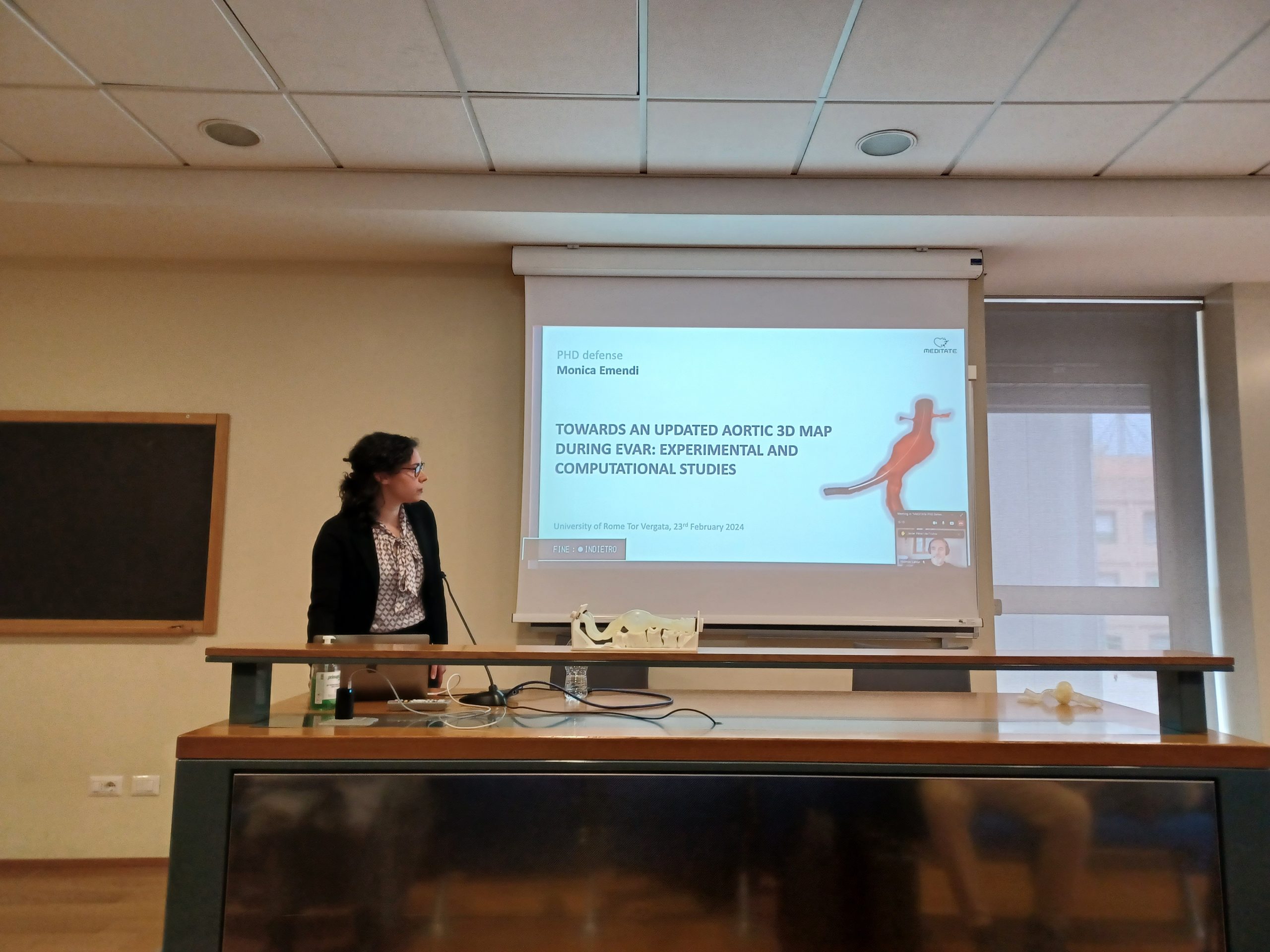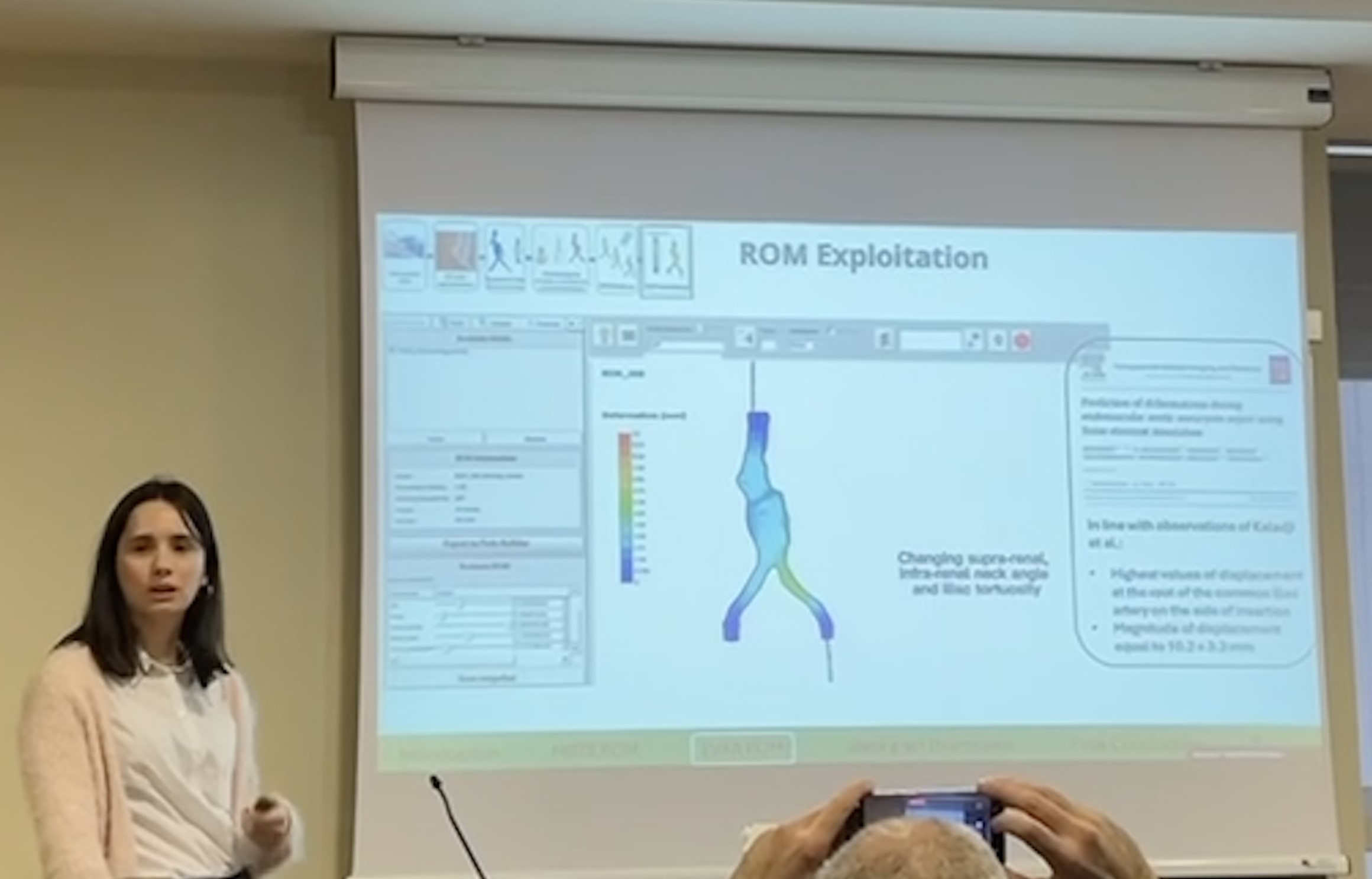Leonardo Geronzi ESR 02 of the MeDiTATe Project among Forbes Italia’s Top 100 Under 30

We’re thrilled to announce that Leonardo Geronzi, ESR 02 of the MeDiTATe project, has been recognized as one of the top 100 talents under 30 in the Science and HealthCare category by Forbes Italia!
👏🎉 This award reflects Leonardo’s exceptional dedication, innovative contributions, and unwavering commitment to advancing science and healthcare through the MeDiTATe project.
Monica Emendi successfully defended her PhD thesis defense

Last week, Monica Emendi, ESR11 of the MeDiTATe project successfully defended her PhD thesis at the University of Rome “Tor Vergata”. The title of her presentation was “Toward an updated aortic 3D map during EVAR: experimental and computational studies”.
Monica demonstrated how the combination of tracking technology and Finite Element Analysis (FEM), can significantly enhance the image fusion during Endovascular Aneurysm Repair (EVAR). The main advantage of the proposed approach is the unprecedented synergy between tracking technology and FEM, aiming to improve the accuracy and efficiency of EVAR procedures. This unique combination has not been explored before for this purpose, marking a breakthrough in the field.
Congratulations Monica! 🎓
Martino Andrea Scarpolini successfully defended his PhD thesis defense


Last week, Martino Andrea Scarpolini, ESR09 of the MeDiTATe project successfully defended his PhD thesis at the University of Rome “Tor Vergata”. The title of his presentation was “Data-driven modelization for personalized medicine: an application to the thoracic aorta”.
Martino presented a comprehensive framework for automatically segmenting the thoracic aorta, estimating hemodynamic indices using CFD and machine learning approaches, employing a statistical shape model for decision-making, and incorporating in-vivo data assimilation techniques into FSI simulations. The proposed approaches offer advantages such as reduced computation time, decreased reliance on manual operations, the ability to capture the intricate morphology of the aorta, improved speed through GPU implementation, versatility across different anatomical regions, and the alignment of FSI simulations with in-vivo data using data assimilation techniques.
Congratulations Martino! 🎓
Eirini Kardampiki successfully defended her PhD thesis defense

Last week, Eirini Kardampiki, ESR12 of the MeDiTATe project successfully defended her PhD thesis at the University of Rome “Tor Vergata”. The title of her presentation was “Development of Computational Tools for Cardiovascular Applications”.
Eirini demonstrated how to build patient-specific computational models to support clinicians’ decision-making procedures before or during Endovascular Aneurysm Repair (EVAR) operations. In this context, fluid (CFD) and structure (FE) computational models, mesh-morphing techniques, and Reduced Order Modelling (ROM) methods are adopted. The main advantage of the proposed approach is the combination of high-fidelity simulations for precise flow solution, RBF mesh morphing for rapid exploration of a wide spectrum of cardiovascular morphologies, and ROM for efficient real-time predictions. This integrated strategy enhances computational efficiency, enabling swift and accurate clinical applications in the cardiovascular field.
Congratulations Eirini! 🎓
MeDiTATe Newsletter #4 – December 2023

The fourth MeDiTATe project newsletter is out! It contains main news, latest events and much more of the activities carried out in the second semester of the 2023.
The newsletter can be downloaded at the following link: MeDiTATe Newsletter #4 December 2023.
MeDiTATe Newsletter #4 – December 2023

The fourth MeDiTATe project newsletter is out! It contains main news, latest events and much more of the activities carried out in the second semester of the 2023.
The newsletter can be downloaded at the following link: MeDiTATe Newsletter #4 December 2023.
Antonio Martinez successfully defended his PhD thesis defense


On December 1st, Antonio Martinez, ESR01 of the MeDiTATe project successfully defended his PhD thesis at the University of Rome “Tor Vergata”. The title of his work was “Computational Methods for the Analysis of Ascending Aortic Aneurysms”.
Antonio demonstrated how to carry out a patient-specific assessment of the aorta’s condition including an estimation of expected growth. The main novelty of the proposed approach lies in the obtained correlation of the biomarkers with aneurysm growth rate. Additionally, patient specific FSI models were developed, accounting for personalized aortic wall models and calibrated hemodynamics extracted from MRI 4D, which achieved a fidelity level beyond the state of the art.
Congratulations Antonio!
Leonardo Geronzi PhD thesis defense




Last week, on December 1st, Leonardo Geronzi, ESR02 of the MeDiTATe project successfully defended his PhD thesis at the University of Rome “Tor Vergata“. The title of his work was “Towards Digital Twin Technologies for Ascending Aortic Aneurysm Growth Prediction and Real-Time Diagnosis”.
Leonardo demonstrated how to structure a Digital Twin of the aorta based on high-fidelity numerical simulation, integrating methods for aneurysm growth and risk prediction and using surrogate modeling techniques to achieve real-time hemodynamic assessment.
Congratulations Leonardo!
An interview with Prof. Stéphane Avril, Research Coordinator of the MeDiTATe project

We had a small talk with Prof. Stéphane Avril, a member of the Board of the MeDiTATe project. He is a Distinguished Full Professor at Mines Saint-Etienne (France) and co-founder of Predisurge. He has a strong mechanics and biomechanics background as a scientist and as an entrepreneur. He has a long mentoring experience as a Professor of soft tissue biomechanics and as director of the center for biomedical and healthcare engineering at Mines Saint-Etienne. In total he advised or co-advised more than 45 PhD students and mentored 25 post-docs. Teaching and mentoring experience of Stéphane Avril extends to the organization of summer or advanced school in soft tissue biomechanics (he organized 2 advanced schools of the International Center for Mechanical Sciences (CISM) in 2015 and 2017. He guides ESR 07 and ESR 08 in view of his strong expertise in computational biomechanics and supports ESR 03, ESR 10, ESR 13 and ESR 14 for all the advanced biomechanics related topics.
- The MeDiTATe project, a research proposal funded by the European Commission in the framework of Horizon 2020 programme. Can you tell us more about Mines Saint-Etienne and its role in the project?
Mines Saint-Etienne (MSE), founded in 1816, is one of the most prestigious engineering schools in France, ranked in the top 10 graduate schools of engineering. Close links with the corporate world, project-based teaching and innovation are the main assets of the engineering school. In January 2017, Ecole des Mines de Saint-Etienne became part of Institut Mines Télécom (IMT). IMT (https://www.imt.fr/en/) is a national public institution dedicated to higher education, research and innovation in engineering and digital technologies. The institution is under the authority of the Minister for Industry.
The center for biomedical and healthcare engineering (CBHE) is with an INSERM endorsed research unit (SAINBIOSE: U1059) and one of the largest centres for biomedical engineering in France. Composed of 17 permanent faculty members and 40 PhD students and postdocs, and headed by Prof. V. Augusto, its research topics are multidisciplinary, combining engineering and health science. The biomechanics group head by Prof. S. Avril aims to carry out fundamental investigations in the domain of mechanical identification of soft tissues and prostheses, with strong interactions with medical device industries and with the Saint Etienne University Hospital (SEUH).
The biomechanics group, which is the group involved in Meditate, is renowned internationally for its research aimed at improving the treatment of cardiovascular diseases by assisting physicians and surgeons with biomechanical numerical simulations. Recent research directions include: AAA wall mechanics using FEA and growth & remodeling simulations. This fits perfectly with Meditate’s goal to develop digital twins of aortic aneurysms. We supervise 6 ESRs: ESR3, ESR7, ESR8, ESR10, ESR13 and ESR14, all related to computational modelling of the aorta or of endovascular procedures.
- Let’s talk about the idea behind MeDiTATe. The project received funding from the EU in the Framework of Horizon 2020 programme, therefore it is clear that the proposed approach meets the EU’s ambition to exploit scientific research to improve the treatment of the cardiovascular diseases and patient care. In particular, how can the scientific community benefit from your work?
The Meditate projet has led to a significant number of publications in peer-reviewed international journals, highlighting the quantity of scientific results obtained by the ESRs. We also filed at least 4 patents which will be exploited by companies like Predisurge (start-up providing numerical simulations as a service to hospitals and medtech companies with digital twins of the aorta) or Philips (ultrasound division). Another benefit of Meditate is the very advanced training of ESR who will become ambassadors of the digital twin technologies we have been developing, to diffuse them in academia and in the industry.
- How can the digital Twins developed in Meditate be useful for patient’s care?
Thanks to digital twins developed in Meditate, endovascular aneurysm repair has become safer and safer and all patients with an aortic aneurysm have become eligible to these procedures. Moreover, aneurysm biomechanics can now be monitored by combining medical imaging and digital twins developed in Meditate. When they reach all hospitals, these technologies will permit to fully eradicate aneurysm ruptures, saving 30000+ lives every year across the world.
- Professor Avril, the MeDiTATe project has reached the end. What are your thoughts on the achievements at this final stage of the project?
Achievements went far beyond expectations. Thanks to an excellent management team, the project reached all its objectives despite the covid19 pandemics at the beginning. I am amazed by the number of patents and by the commitment of companies participating to Meditate. But the biggest success are the ESRs. They impressed me by the quantity and quality of their work in their PhD. I have no doubt they will all have successful careers in academia or in the industry and will keep unforgettable memories of the Meditate project.
- Any message for our readers?
If you know someone around you who was diagnosed with an aneurysm, tell her or him about Meditate. She/he can mention Meditate to her/his doctor to have access to digital twin technologies in the treatment.
Recent Posts
- MeDiTATe final video: results
- Leonardo Geronzi ESR 02 of the MeDiTATe Project among Forbes Italia’s Top 100 Under 30
- Monica Emendi successfully defended her PhD thesis defense
- Martino Andrea Scarpolini successfully defended his PhD thesis defense
- Eirini Kardampiki successfully defended her PhD thesis defense
Archives
- June 2024
- March 2024
- February 2024
- December 2023
- October 2023
- September 2023
- August 2023
- July 2023
- June 2023
- May 2023
- April 2023
- March 2023
- February 2023
- January 2023
- December 2022
- November 2022
- October 2022
- September 2022
- August 2022
- July 2022
- June 2022
- May 2022
- April 2022
- March 2022
- March 2021
- February 2021
- December 2020
- November 2020
- February 2020
- January 2020


